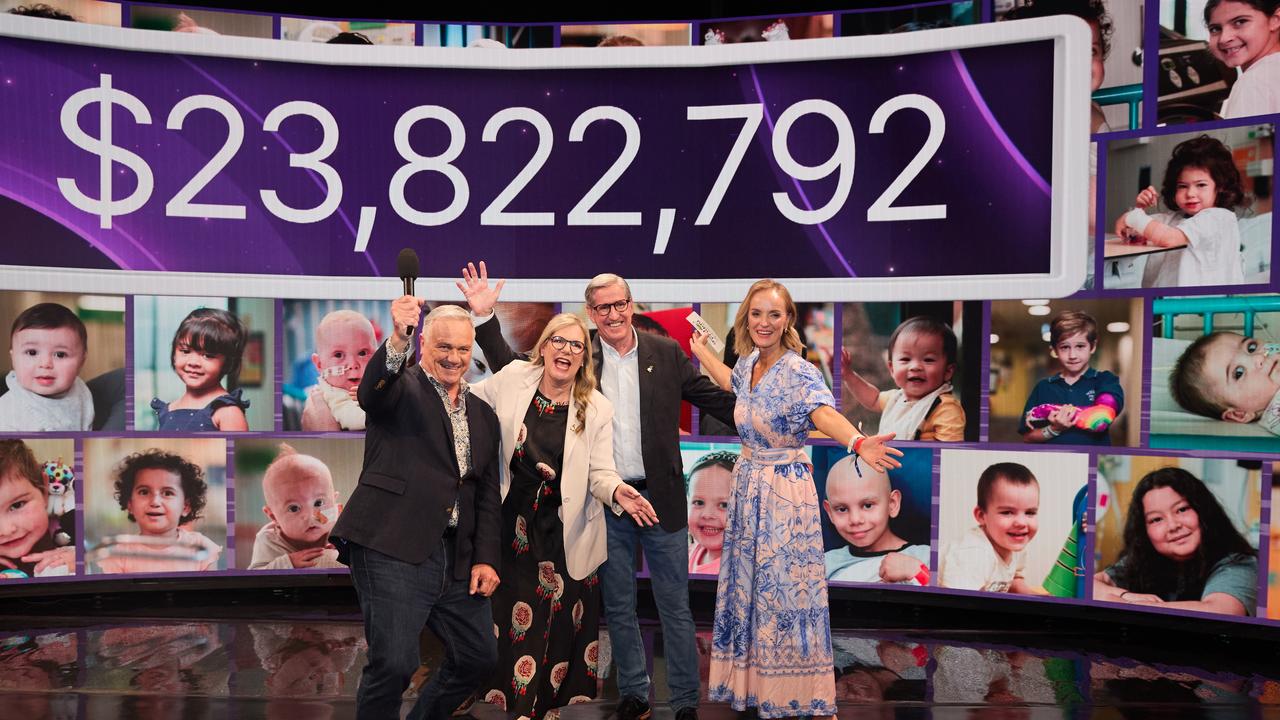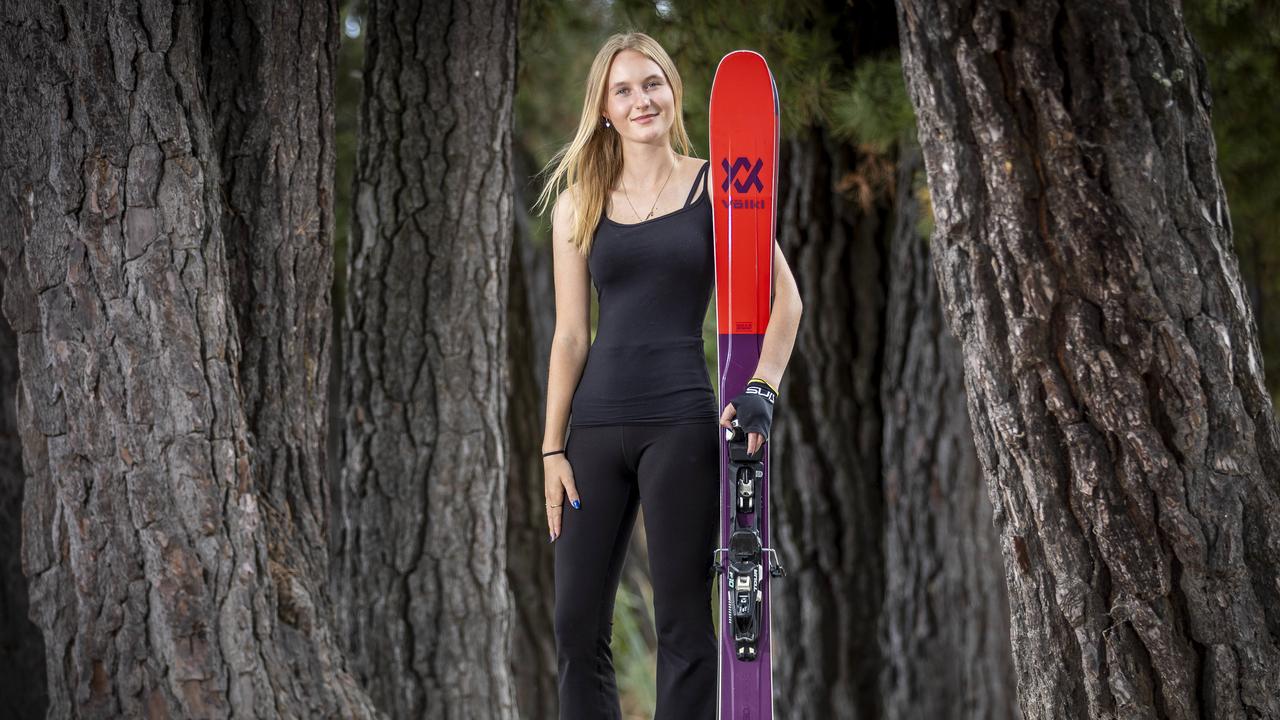Good Friday Appeal 2024: How Tedi Rudd born at just 600g defied the odds to survive
Born at 23 weeks, little Tedi underwent multiple surgeries and died “a few times” — but he defied all the odds and is now living his best life.
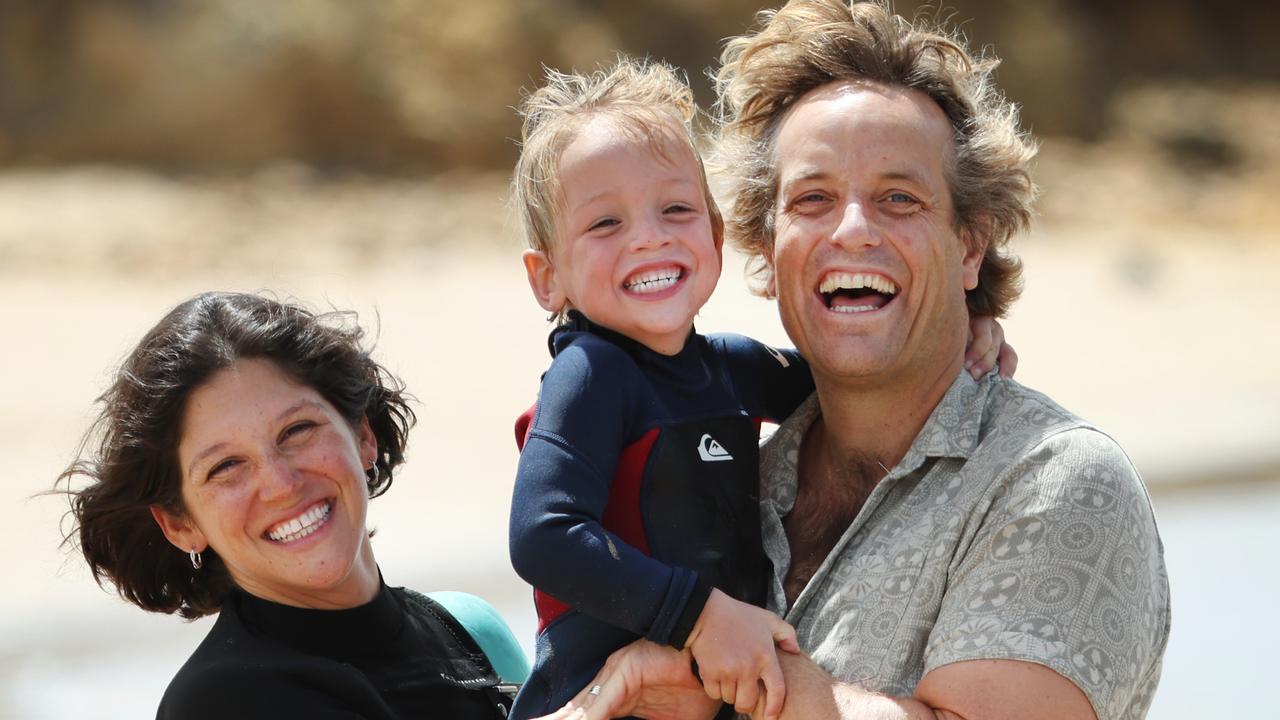
When twins Tedi and Santiago were born at 23 weeks, parents Zac and Nela Rudd had to make a life-or-death decision.
While Nela was in labour, the couple was warned the odds were dire for babies born so early.
“At that point, 23 weeks was the earliest they keep them alive, but between 23 and 25 weeks, it’s the parents’ decision whether to go through with it or not,” Mr Rudd said.
“The alternative is they just put them with you, and they’ll breathe out.
“I think it was less than a 50 per cent chance of survival for both.
“And I think worse than the survival stats are the disability stats. I think we were up around 80 to 90 per cent permanent, severe disability.”
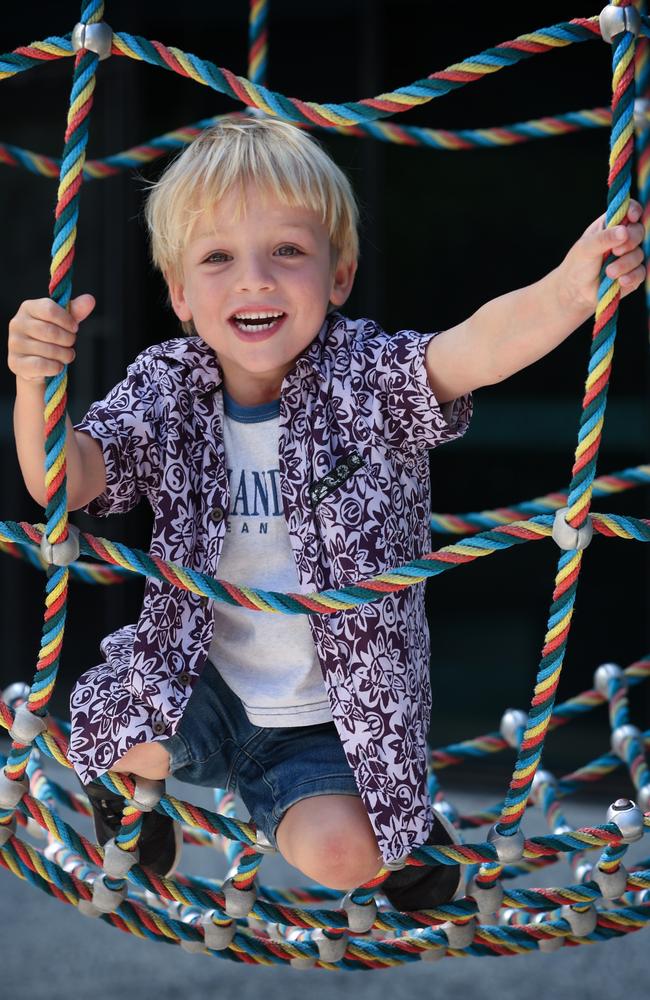
Both options were grim, but the couple decided “one was less grim than the other”.
“One side had hope, the other side had zero hope,” Mr Rudd said.
“I was a mess, but I’d go downstairs and be a mess on my own, and then try and put on a brave face and come back.”
Tedi, the smallest, weighed just 600g and was the size of his dad’s hand.
Both boys spent months on life support – Santi at the Royal Women’s Hospital, where the twins were born, and Tedi at the Royal Children’s.
“I didn’t know at the time, but he was dying, very much dying, when he arrived at the Royal Children’s, so they’ve saved him so many times,” Mr Rudd said.
“Tedi passed away a few times, and was brought back with CPR.
“He passed away on Nela once and they were doing CPR on top of her. He’s had broken ribs from CPR. He had brain bleeds as well, so that was all touch and go.”
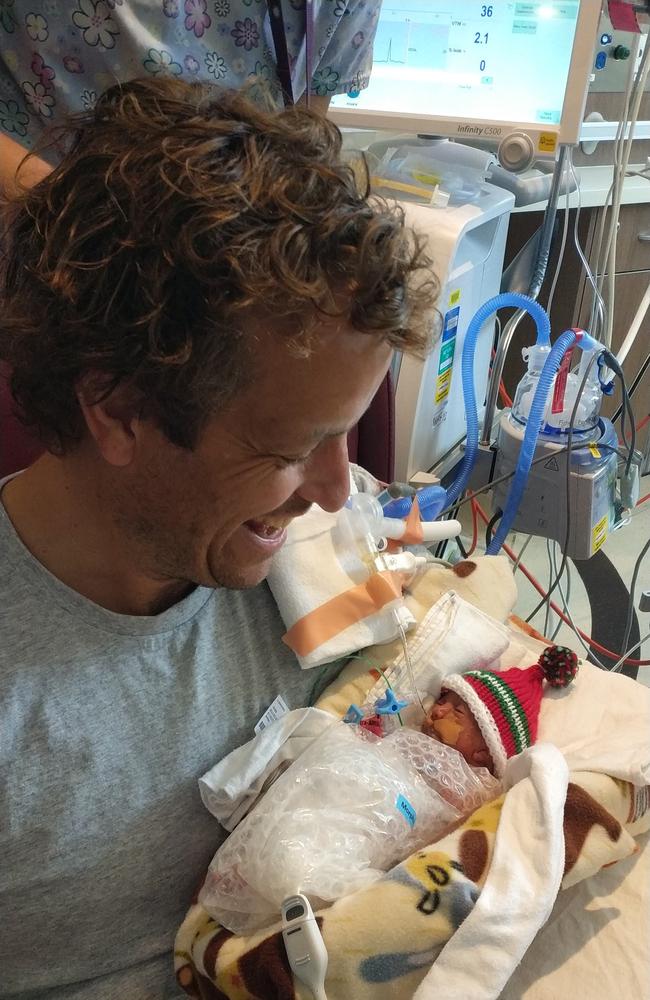
Only weeks old, Tedi needed surgery to remove a large part of his bowel because of a devastating illness called necrotising enterocolitis.
“It’s actually the breakdown of the intestines and then the acids and stuff start going into the body and then they go into a toxic shock, so Tedi looked like a frog,” Mr Rudd said.
Tedi also needed a tracheostomy – a surgical opening into the windpipe, or trachea.
“The reason he had a trachy is because he had so many emergency intubations – it all scarred up until it was closed,” Mr Rudd said.
For three years, Tedi breathed through a tube in his throat.
“If he was sick, which happened so often, Nela and I would do shifts – you couldn’t sleep because he would drown in his secretions,” Mr Rudd said.
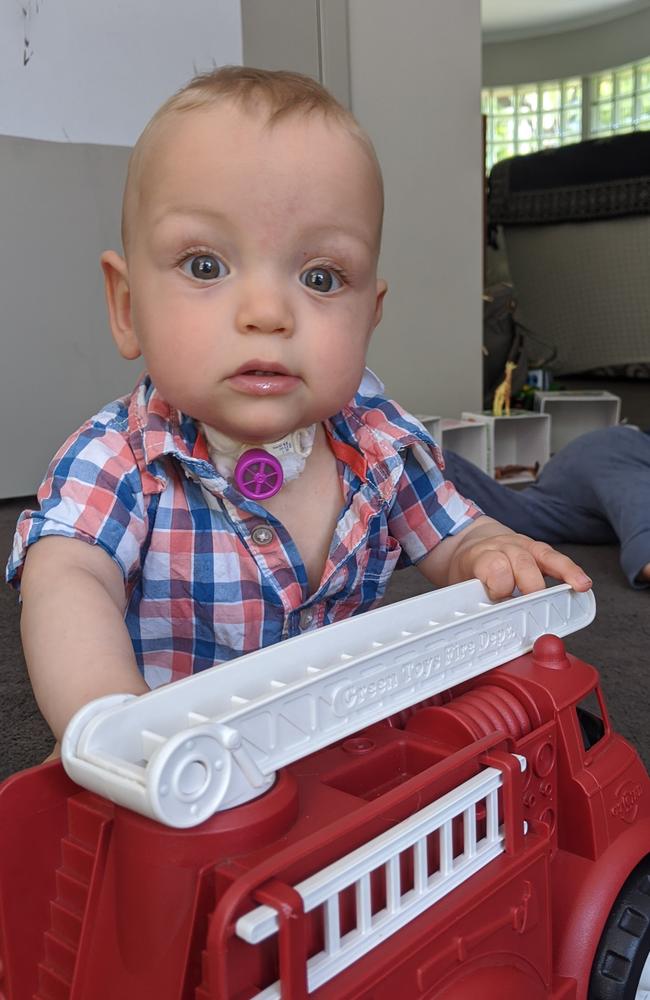
But now Tedi’s future looks incredibly bright.
His trachea was rebuilt at the Royal Children’s using cartilage from his rib.
The four-year-old’s family moved from Melbourne to Torquay, where he loves boogie boarding and swimming with his brothers when he’s not at kindergarten.
“He’s the happiest and craziest kid,” Mr Rudd said. “And we are the luckiest two people in the world.”
Ear, nose and throat specialist Eric Levi described his patient as “a hero” for the way he handled everything life threw at him.
“He has an amazing resilience,” Dr Levi said.
“People think that surgeons and doctors change lives.
“No, patients change the doctors’ lives too.
“The kind of satisfaction that I get from seeing him running at 100 miles an hour just brings a lot of joy, not just to me, but to the rest of the team as well.”
Mr Rudd said the decision to share the Good Friday Appeal’s funding with regional hospitals was “incredible”.
“We had parents alongside us that were coming from as far away as Warrnambool, and some of the outcomes were poorer because they had to bypass and get this far for the level of care they needed,” he said.
“So this will be game-changing.”
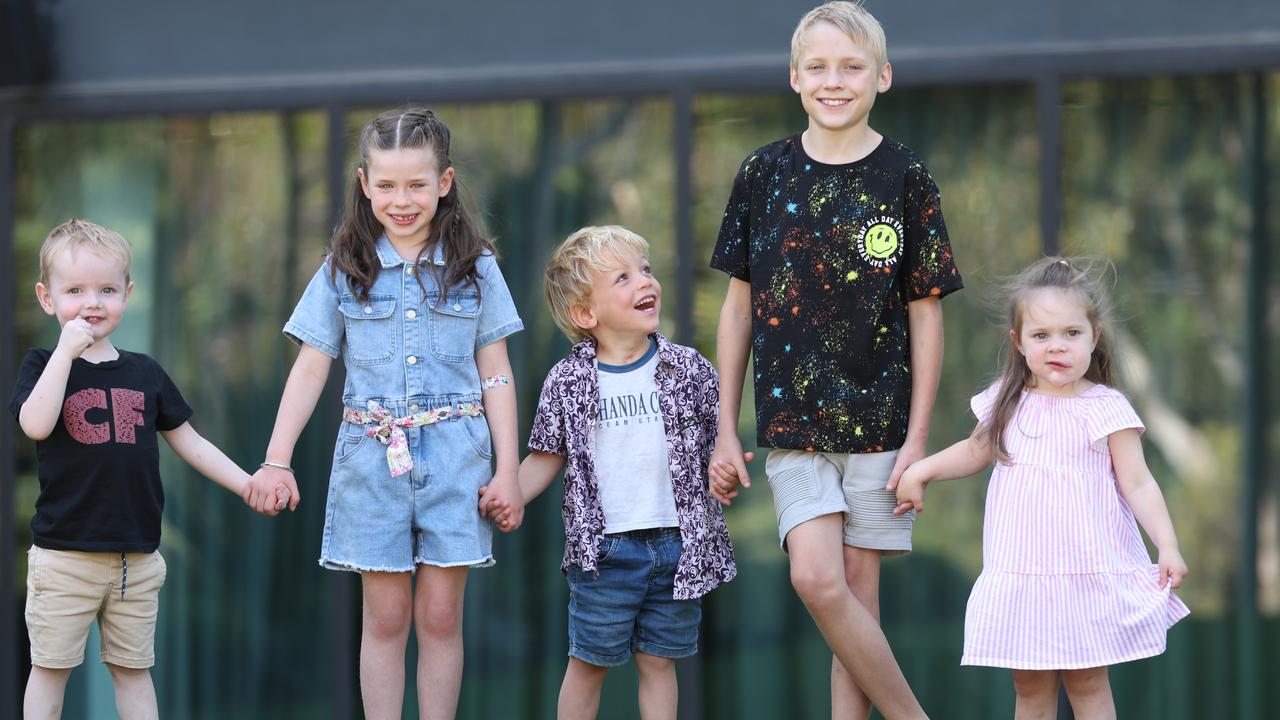
Regional boost a game-changer for Ollie
It’s the routine heel prick test given to every newborn, but for Ollie Robertson’s parents it delivered the shock of their life.
The brave boy from Ballarat was three weeks old when Mel and Peter Robertson were told he had cystic fibrosis.
“It was a massive shock to us because for someone to have CF, you have to be both carriers and we already had three children and they didn’t have CF,” Mrs Robertson said.
“We then rushed down to Melbourne to meet our respiratory doctor at the Royal Children’s.”
Ollie’s three years since have revolved around twice-daily physiotherapy, medications, and all-too-regular “tune-ups” at the Royal Children’s Hospital to keep him in good health.
“Ollie’s been in and out of the hospital since he was three weeks old,” Mrs Robertson said. “All up he’s had 10 14-day admissions.
“Having CF means that Ollie gets a build-up of mucus that affects his lungs and blocks the airways and his digestive system.
“It’s been a really tough road for him, but he’s a really resilient little boy.”
About one in every 2500 babies has cystic fibrosis, for which there is no cure. CF primarily affects the lungs and digestive system.
The constant trips to the city have been mentally draining and physically exhausting for the Robertsons, while juggling the needs of three other children. Mrs Robertson had to give up her job at the Ballarat Base Hospital to give Ollie around-the-clock care.
The couple hopes the new funding boost for regional hospitals thanks to the Good Friday Appeal will make a world of difference to children like Ollie and their families.
“It’s fantastic,” Mrs Robertson said.
“It means I can be close to the three older children as well and not two hours’ away. It will just help our family a lot.”
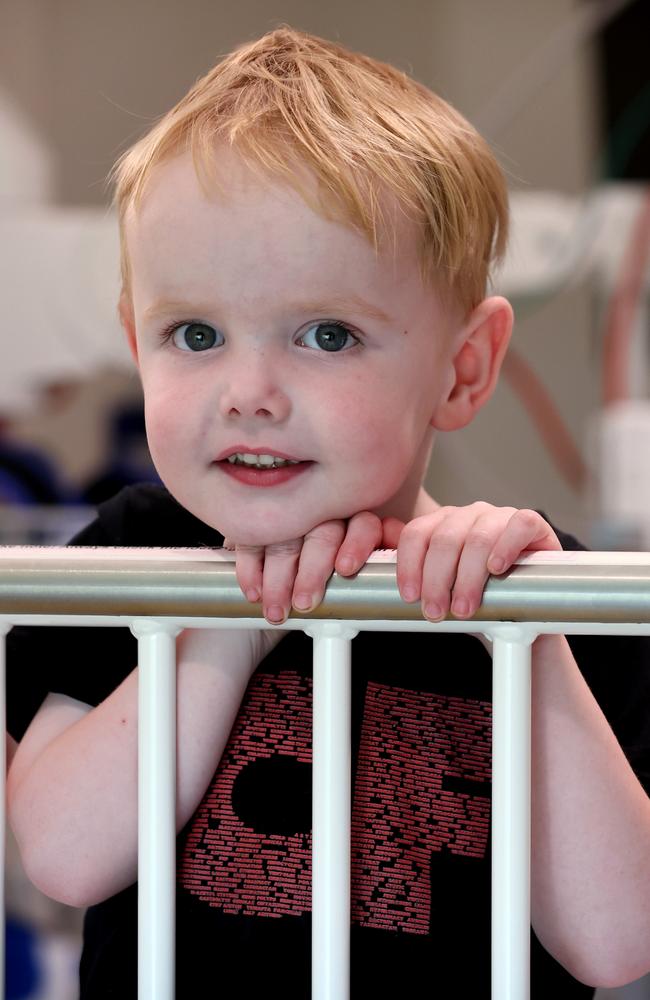
Blood screening potential hits sweet spot for Ava
Like any lively six-year-old, Ava Rees loves chocolate.
But she knows more than a small bite at a time could lead to permanent brain damage.
“At Easter, I can’t have chocolate Easter eggs,” the grade 1 student said.
“It could make my brain go silly and make me go to hospital and die.
“It just makes me upset because I can’t have chocolate, milk and lots of other stuff that’s yummy.”
Ava, from Numurkah in the Goulburn Valley, was born with a genetic condition called maple syrup urine disease that is so rare it affects only one in 150,000 children.
She must follow a strict low-protein diet for life: no meat, no dairy, limited gluten.
Ava has been a patient at the Royal Children’s Hospital since she was a newborn, after her disease was detected by a routine heel prick test.
Mrs Rees was told to rush Ava into Shepparton Hospital’s emergency department, from where she was flown to the Royal Children’s in Melbourne.
“The diagnosis was horrible; the first 12 months was horrible,” Mrs Rees said.
“She has to be on a very strict low-protein diet or she can get brain damage.
“Absolute worst case, if she went off diet, she’d be very ill and end up in a coma. So it’s very, very serious, but easily managed.”
From when she was tiny, Ava learned to say, “I can’t have that because it will hurt my brain.”
The name for the disease stems from a symptom – people with maple syrup urine disease can have sweet-smelling urine, similar to maple syrup, when they get ill.
Ava has a weekly finger prick blood test to check her amino acids, and her diet is tweaked accordingly.
But Mrs Rees said after sending the sample to the Royal Children’s, it took a week to get the results.
Mrs Rees hopes the Good Friday Appeal’s expansion of funding to regional hospitals could mean Ava’s blood samples can be tested locally.
“If we can get results the same day, it would mean we could potentially play around with her diet,” she said. “But we can’t risk that now.”
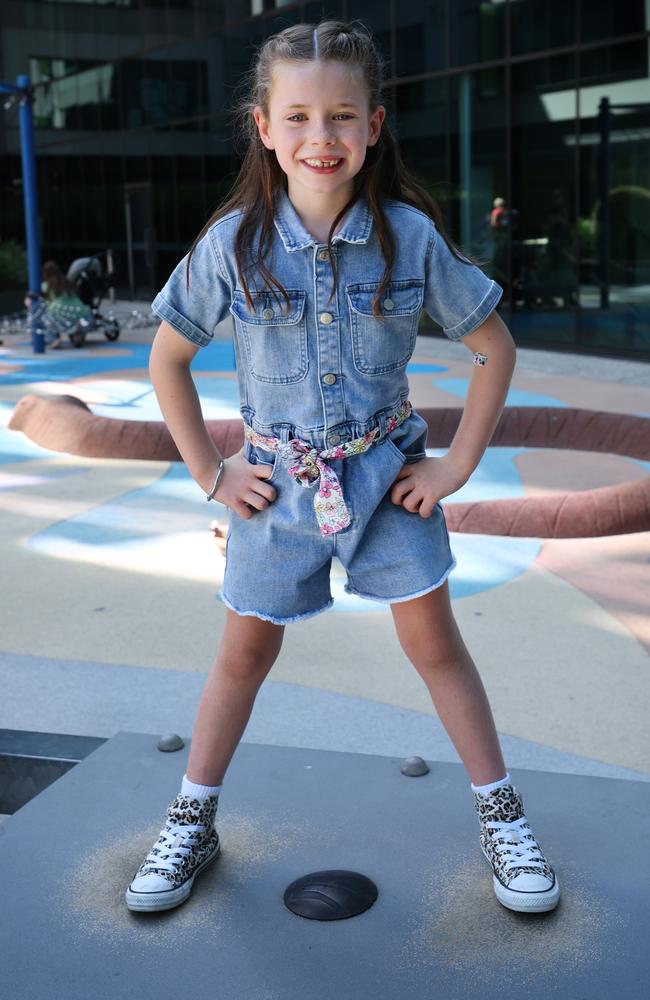
Resilient Dom beats the odds
Dominic Beagley’s 10-year journey at the Royal Children’s Hospital began when his breathing became laboured days after birth.
“We were flown down here from Bendigo when he was three days old in the middle of the night,” said Dom’s mum, Megan Beagley.
“We arrived and a resus room was waiting for us. I was absolutely terrified.
“They did an X-ray and found out that none of his organs were where they were supposed to be.”
For the Bendigo mum, those first few hours were devastating and confronting.
“I’d had my baby and I’d gone home to start this beautiful life and, in a moment, everything came crashing down,” she said.
It took several months before Dom was diagnosed with primary ciliary dyskinesia, which is similar to cystic fibrosis.
The rare genetic disease affects tiny, hairlike structures called cilia that line the airways and can cause chronic infections of the lungs, ears and sinuses.
Like many kids with PCD, Dom also has dextrocardia, meaning his heart is on the right side of his chest.
Luckily, his early diagnosis allowed doctors to give Dom the best possible start to life.
In all, the 10-year-old has notched up about 30 surgeries and procedures at the Royal Children’s.
“He copes incredibly well,” Ms Beagley said. “I think both me and Dom are much kinder and better humans now than we ever could have been. I think having a sick kid makes you a better human.”
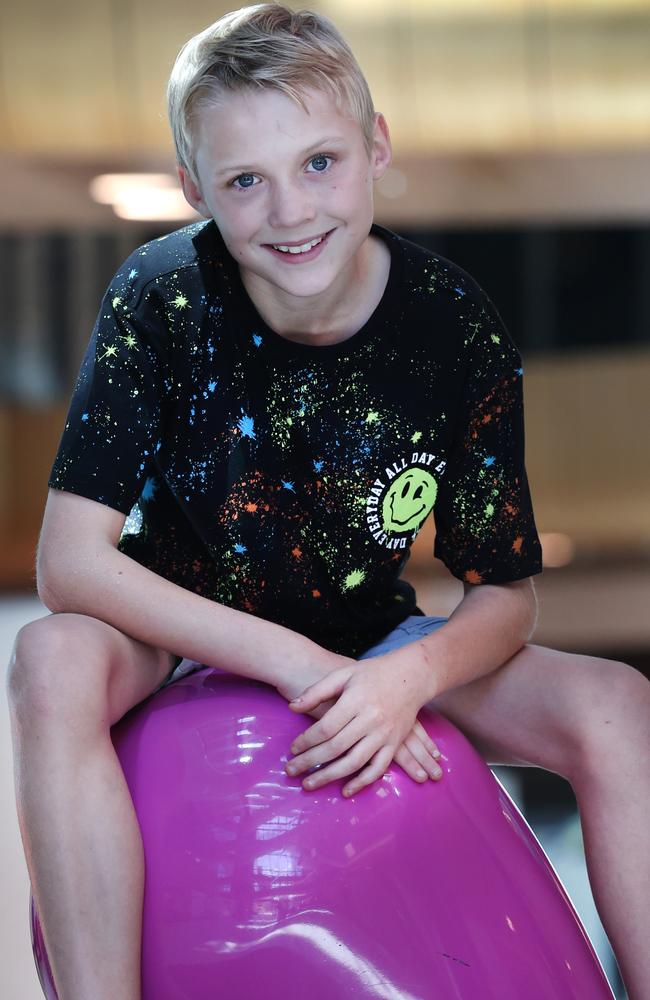
Maisie’s doing the hard yards with a smile
After 24 appointments in the past 12 months, Mickey and Hayden Davies know the road from their Warragul home to the Royal Children’s Hospital all too well.
Maisie, 2, needs regular treatment at the hospital for a rare condition called lymphatic malformation.
The condition causes Maisie’s face to swell and mouth to bleed every few weeks.
And it means she will be a patient at the Royal Children’s for her entire childhood.
Mrs Davies said the decision to share the Good Friday Appeal’s funding with regional hospitals would make an enormous difference to families like hers.
“That’s going to be amazing, because if we have to come in it’s a four-hour return trip every time,” she said.
“And sometimes it’s days, so it’s going to be amazing to be able to go a bit more local so we’re not spending days out this way. It’s a benefit for us and everyone out in our area.”
Maisie, a lockdown baby, was born with her condition.
But it didn’t become obvious until she got Covid at nine months and one side of her face swelled up alarmingly.
“It wouldn’t go down, and it kept growing every time she got sick,” Mrs Davies said.
“We saw the specialists and they said they thought it was cancer, so we had a few scary weeks where we had to try and work out what was going on.”
Maisie was referred to the Royal Children’s, where her condition was diagnosed just before her first birthday.
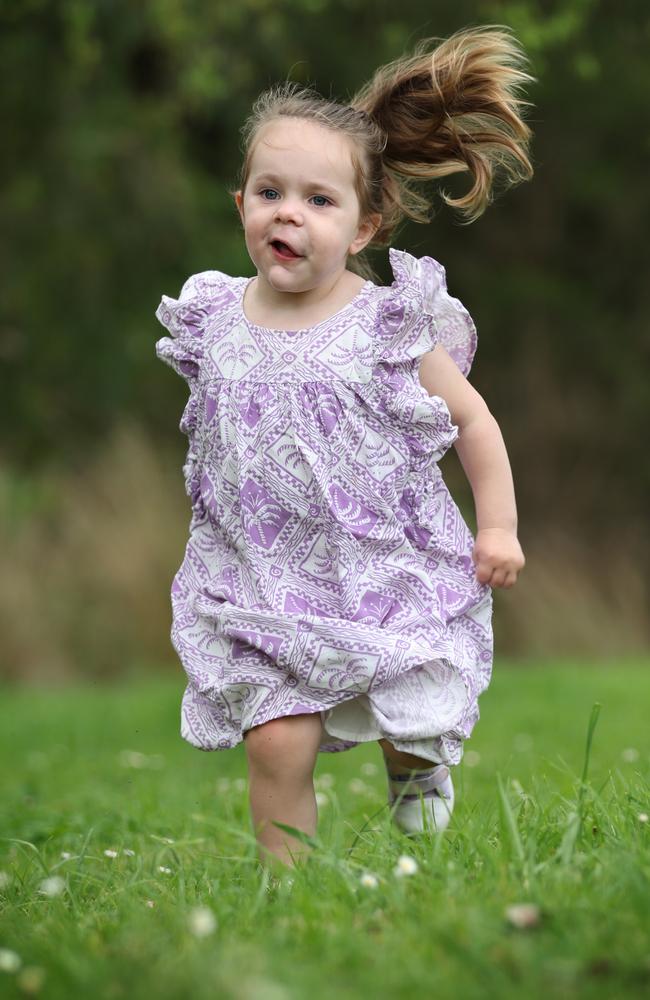
Maisie has been treated by a team of specialists from a range of disciplines ever since.
“Her lymphatic system cells have kind of bundled together and caused these knots in her cheek, so they’ve created cysts,” Mrs Davies said.
“The micro cysts fill up with fluid and blood when she’s sick so they cause bleeds and swelling, so she quite often is in pain. It can be caused by sickness, or by her knocking it, or it can just be spontaneous ... it’s always a guessing game.”
The most terrifying moment was when Maisie’s face “doubled in size” out of the blue a year ago. “We didn’t know if it was going to stop,” Mrs Davies said.
Maisie’s clinical nurse consultant, Jodie Simpson, said specialists from a wide variety of disciplines at the hospital worked together to offer her the best possible treatment.
“We see a number of kids like Maisie with very disfiguring lymphatic malformations involving their face and their neck,” she said.
“Lymphatic malformations can vary from a tiny little malformation that’s not causing too many issues to major functional impairment that really affects quality of life, and Maisie probably falls into that category.
“But she’s very resilient.”
Maisie has undergone sclerotherapy – a drug was injected into the cysts to try to reduce the swelling – and will have plastic surgery this year.
“She’ll have a debulking surgery where they’ll do a partial facial reconstruction on her lip and cheek and jaw,” Mrs Davies said.
The Davies can’t speak highly enough of the world-class care they’ve had at the Royal Children’s.
“Having people who are experts in her condition is amazing. And they are liaising with lots of specialists overseas as well,” Mrs Davies said.



